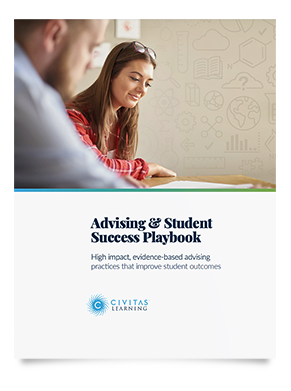
Easing Academic Advisor Capacity Constraints with Real-Time Visibility into Student Need
Share this Post
With advising caseloads of around 300-350 students per advisor, registration week at one public university in the Western United States can be very busy for advisors and stressful for students. Yet, at other times during the semester, students disappear into their classes, and advisors experience a lull in the demand for their services.
Robust academic advising services are available for undergraduates, but students aren’t required to utilize them. To prioritize outreach, advisors need effective tools to help them reach out to students in a targeted and proactive manner to provide real-time support. With the help of Civitas Learning’s advising analytics and workflow solutions, advisors use predictive analytics to prioritize outreach at critical moments in a student’s journey, helping them feel seen and supported by their advisors.
Managing High Appointment Demand During Open Registration
Advisors work long hours during registration to provide the immediate help students need. Still, there’s not enough time to dig deeper with students to discuss how they’re doing in classes, their academic and professional goals, and their plans to achieve those goals. If students only see their academic advisor during registration, they’re not getting the best support these highly skilled and caring professionals can provide.
And yet it isn’t easy for some students to ask for help even when it’s clear they need it. Students may believe they’re all alone pursuing their academic goals or think asking for help is a sign that they don’t belong in college. These beliefs and perceptions persist among college students and can be more acute among first-generation and historically marginalized students.
To overcome students’ hesitation about asking for help, advisors need a sixth sense to help them proactively identify and authentically reach out to students who may need support. The right outreach at the right time can help students connect to support while there’s still time to correct the problem and get the student back on track for a successful semester.
“I watched advisors have slow and busy times when meeting with students. The tool helped make my caseload manageable by enabling me to consistently meet with students all semester long. I could go home at five every day, even during registration, and feel like everybody was okay. I didn’t leave somebody’s fire burning overnight.”
Using Predictive Analytics to Prioritize Proactive Outreach Throughout the Term
From the beginning, one advisor recognized predictive analytics as a powerful tool to help her do her best work with students. “It allows me to be there when students need me and provide proactive help rather than wait until grades post at the end of the semester. I can now start those conversations while there’s still time to get them help and support.”
Being available and accessible to students is part of the culture of care. This advisor doesn’t wait until students think they need help to reach out to them. Instead, she continually monitors students’ likelihood to persist in using the Civitas Learning Student Impact Platform to systematically and proactively check in with students.
“It’s not. I’m going to send one mass email to all 300 students.’ It’s, ‘I’m going to use this tool and narrow it down. And email 20-30 students who had a change in persistence probability, who may be struggling, or who had a lower probability, to begin with. And say, ‘Hey, I was thinking about you. How’s this semester going? Have you thought about using some of these tools? Or would you like to come in and visit with me?'” In this way, she can keep better track of her students, stay on top of changes in their academic performance, and better understand the history of her outreach efforts to each student.
Advising and Student Success Playbook
Building a More Manageable Workflow and Stronger Student Relationships
This proactive outreach strategy not only helped this advisor provide real-time support to students but also enables her to more efficiently and effectively manage her advising caseload and steadily engage students throughout the academic year. “I watched advisors have slow and busy times when meeting with students. The tool helped make my caseload manageable by enabling me to meet consistently with students all semester long. I could go home at five every day, even during registration, and feel like everybody was okay. I didn’t leave somebody’s fire burning overnight.”
Being able to more efficiently manage her caseload and meet the real-time needs of her students are essential aspects of effectiveness as an academic advisor. Building relationships and trust with students is crucial to helping them succeed.
It may seem counterintuitive that student data can help an advisor build trust with her students. But access to actionable analytics that includes behavioral and engagement data, which uncovers the bigger picture, fosters open communication with students, and provides opportunities to tailor advice to students’ specific challenges. Empowered with visibility into a student’s situation, advisors can focus on solutions and strategies that play to the student’s strengths rather than staying mired in figuring out what’s going on.
This helps students feel seen and supported, which builds trust with advisors. “Predictive analytics made it less about numbers and more about people -especially now, students need to be seen more than ever, and these tools help me see them.”
Empowered to Proactively Help Students Succeed
By partnering with Civitas Learning, academic advisors have access to the tools they need to provide real-time student support, more efficiently and effectively manage their caseloads, and build trusting relationships with students. Intelligent workflows and integrated case management allow advisors to proactively identify students needing help and provide tailored advice, making students feel seen and supported. A data-activated approach supports efforts to cultivate caring relationships with students and make an impact daily to improve academic motivation and persistence.



